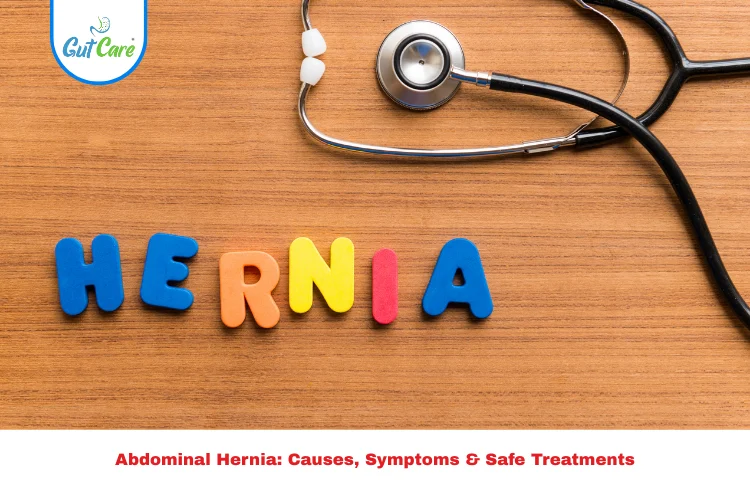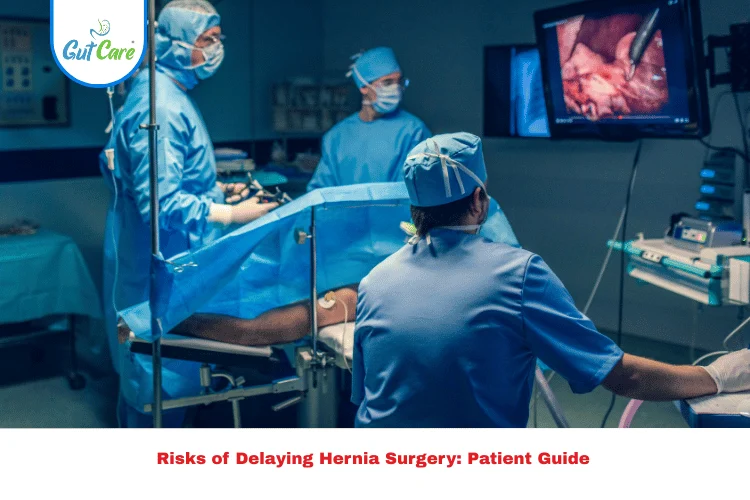An abdominal hernia is a common medical condition where an organ or tissue pushes through a weak spot in the abdominal wall. Though many people initially ignore the signs, hernias can worsen over time and may require medical intervention. At Gutcare Clinics in Bangalore, specialists like Dr. Yuvrajsingh Gehlot provide advanced care and treatment for different types of hernias.
What is an Abdominal Hernia?
An abdominal hernia occurs when an internal organ, usually the intestine, protrudes through a weakened area in the abdominal muscles. This bulge is often visible, especially when coughing, bending, or lifting heavy objects. While not all hernias are painful, they do not heal on their own and may worsen if untreated.
Common Causes of Abdominal Hernia
Several factors can contribute to the development of an abdominal hernia:
- Weak abdominal muscles (can be congenital or develop over time).
- Heavy lifting without proper support.
- Chronic cough or sneezing (due to conditions like asthma or allergies).
- Obesity which puts extra pressure on the abdomen.
- Pregnancy that stretches the abdominal wall.
- Previous abdominal surgeries leading to weakened tissues.
Symptoms of Abdominal Hernia
The symptoms vary depending on its size and severity. Common signs include:
- Visible bulge in the abdomen that becomes more noticeable when standing or straining.
- Pain or discomfort, especially during physical activity.
- Burning or aching sensation near the bulge.
- Nausea or vomiting in severe cases.
- Bowel obstruction if the hernia becomes strangulated (medical emergency).
If you experience persistent pain, nausea, or changes in bowel movements, it’s crucial to seek immediate medical attention.
Types of Abdominal Hernia
There are different types, including:
- Inguinal Hernia – The most common type, occurring in the groin area.
- Umbilical Hernia – Common in infants but can also affect adults near the belly button.
- Incisional Hernia – Appears at the site of a previous surgery.
- Hiatal Hernia – Occurs when part of the stomach pushes into the chest cavity.
- Femoral Hernia – Less common, but seen more in women, located near the upper thigh.
Diagnosis
To confirm an abdominal hernia, a specialist like Dr. Yuvrajsingh Gehlot will:
- Conduct a physical examination.
- Recommend ultrasound or CT scans if needed.
- Check for signs of complications such as strangulation or obstruction.
Treatment Options for Abdominal Hernia
1. Lifestyle Modifications
- Avoid heavy lifting.
- Maintain a healthy weight.
- Use supportive belts (only as advised by a doctor).
2. Medications
While medications cannot cure hernias, they can help manage symptoms like acid reflux in cases of hiatal hernia.
3. Surgical Treatment
Surgery is the most effective solution for an abdominal hernia. Procedures include:
- Open Hernia Repair (Herniorrhaphy) – The surgeon makes an incision and pushes the hernia back into place, strengthening the abdominal wall with stitches.
- Laparoscopic Surgery – A minimally invasive option with faster recovery and smaller scars.
At Gutcare Clinics, Bangalore, minimally invasive techniques are often recommended for quicker healing and reduced discomfort.
Why Consult a Specialist?
Ignoring an abdominal hernia can lead to severe complications, including strangulation of the intestines, which is a life-threatening emergency. Consulting a specialist such as Dr. Yuvrajsingh Gehlot ensures proper diagnosis, safe treatment, and long-term recovery.
Living with an Abdominal Hernia: Tips for Prevention
While not all hernias can be prevented, you can reduce your risk with these steps:
- Exercise regularly to strengthen abdominal muscles.
- Eat a high-fiber diet to prevent constipation and straining.
- Stop smoking, as it reduces chronic coughing.
- Lift correctly, using your legs instead of your back.
Conclusion
An abdominal hernia is a manageable condition if diagnosed and treated early. Lifestyle changes, medications for symptom control, and surgery are the main treatment options. At Gutcare Clinics in Bangalore, experts like Dr. Yuvrajsingh Gehlot provide advanced care tailored to each patient’s needs.
If you notice symptoms like a bulge in the abdomen, persistent pain, or digestive issues, don’t ignore them. Early consultation with a specialist ensures effective treatment and prevents complications.
Frequently Asked Questions (FAQs)
1. What is the first sign of an abdominal hernia?
The most common early sign of an abdominal hernia is a noticeable bulge in the abdomen, which may become more visible when coughing or standing.
2. Can an abdominal hernia heal without surgery?
No, an abdominal hernia cannot heal on its own. While lifestyle changes may relieve symptoms, surgery is the only definitive treatment.
3. Who is the best specialist for abdominal hernia in Bangalore?
For expert care, Dr. Yuvrajsingh Gehlot at Gutcare Clinics, Bangalore, is highly recommended for diagnosis and advanced treatment.
4. What happens if an abdominal hernia is left untreated?
If untreated, an abdominal hernia can enlarge and lead to serious complications such as bowel obstruction or strangulation, which requires emergency surgery.
5. How long does recovery take after hernia surgery at Gutcare Clinics?
Recovery time varies depending on the type of surgery, but most patients at Gutcare Clinics in Bangalore resume normal activities within 1–2 weeks after minimally invasive procedures.




